May 27, 2025 | 07:18 GMT +7
May 27, 2025 | 07:18 GMT +7
Hotline: 0913.378.918
May 27, 2025 | 07:18 GMT +7
Hotline: 0913.378.918
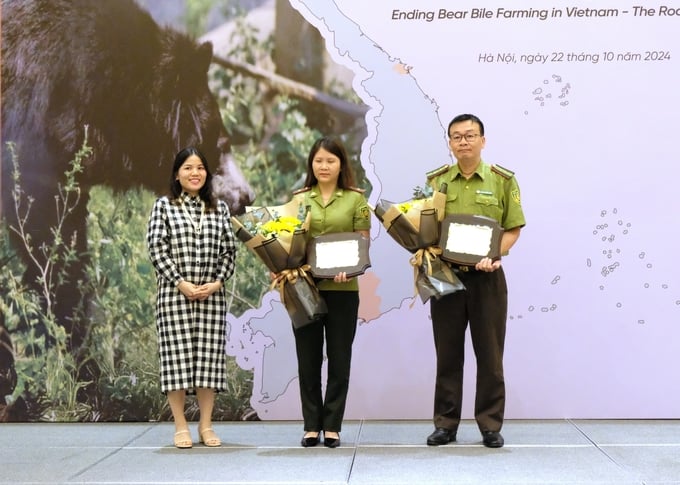
Ms. Bui Thi Ha (left), Deputy Director of ENV, presents a commemorative medal to the forest rangers. Photo: ENV.
On October 22, the Education for Nature Vietnam (ENV) organized an event titled “Ending Bear Bile Farming in Vietnam – The Road to Victory” reflecting on significant milestones in the nearly 20-year effort to end the practice of bear bile farming in the country.
In 2005, after discovering around 4,000 bears being kept for bile extraction nationwide, the Ministry of Agriculture and Rural Development (MARD) collaborated with the World Animal Protection (WAP) to launch a campaign aimed at gradually eliminating this issue.
Since the beginning, MARD issued Decision 02/2005/QD-BNN concerning the management of captive bears. According to this decision, all captive bears must be fitted with electronic chips for identification and management. Bears that are not registered and chipped will be confiscated. The registration and chipping of bears were completed by 2006.
The campaign to end bear bile farming has involved the participation of several organizations, including ENV, Animals Asia Foundation (AAF), Four Paws, and Free The Bears. These organizations have supported bear rescue operations, assisted law enforcement in addressing violations related to bears, reduced the demand for bear bile consumption, and encouraged bear owners to voluntarily transfer their bears to rescue centers.
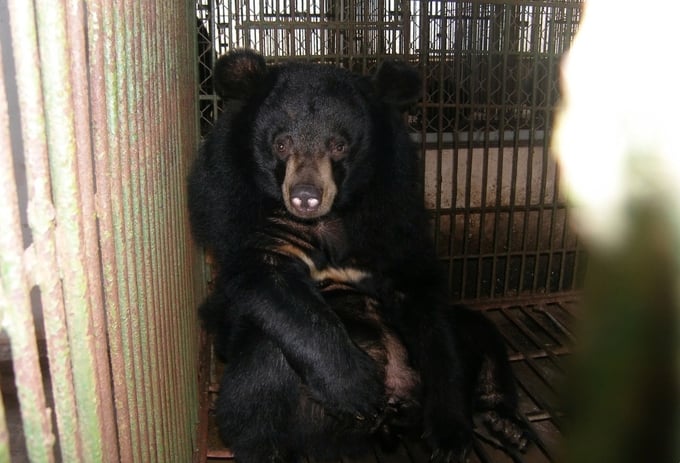
The journey to end bear farming in Vietnam, which was undergone for nearly 20 years, has yielded many positive results. Photo: ENV.
Ms. Bui Thi Ha, Deputy Director of ENV, reported that after nearly 20 years of continuous efforts, the number of captive bears has decreased by 95%, from around 4,000 in 2005 to 192 at 60 bear farms as of the end of August 2024. Currently, 46 out of 63 provinces no longer have bears kept for bile extraction, and demand for bear bile in urban areas has decreased by 61%.
According to her, one of the biggest challenges in the nearly 20-year effort to end bear bile farming in Vietnam has been persuading bear owners to voluntarily transfer their bears. Additionally, the demand for bear bile and products from bears among some segments of the population continues to drive the practice of captivity and bile trade. Bear owners still profit from bile extraction, which is why they have yet to transfer their bears to the state.
“Therefore, in the future, we need to implement stronger measures and actions, with proactive involvement from state agencies to raise public awareness. We also need strict regulations and penalties to deter those who advertise and trade in bear bile and bear products, as these items are prohibited by law,” emphasized an ENV representative.
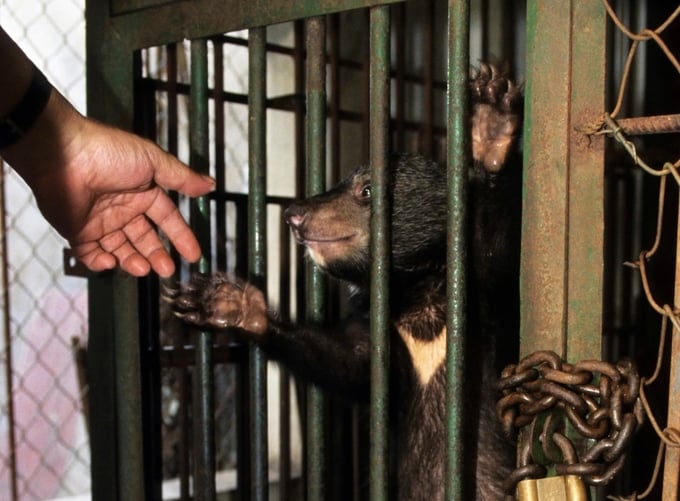
The continued demand for bear bile and products has fueled the practice of bear captivity and trade. Photo: ENV.
Ms. Bui Thi Ha highlighted that over the years, the Department of Forestry and provincial forest rangers have played a crucial role in gradually eliminating bear bile farming through registration, chipping, regular monitoring of captive bear populations, and ensuring effective enforcement of bear protection laws.
Moreover, media and press agencies have also played an important role in supporting state management agencies and organizations in raising public awareness, thereby reducing the demand for bear bile and bear products. This contributes to the protection and conservation of bear populations and the prevention of violations related to bears.
“We appreciate the attention and commitment of MARD, various departments, and media units, as well as the strong determination of law enforcement agencies, especially at the local level. We would not have achieved these positive results without the persistent efforts of all agencies and units over nearly 20 years,” stated the Deputy Director of ENV.
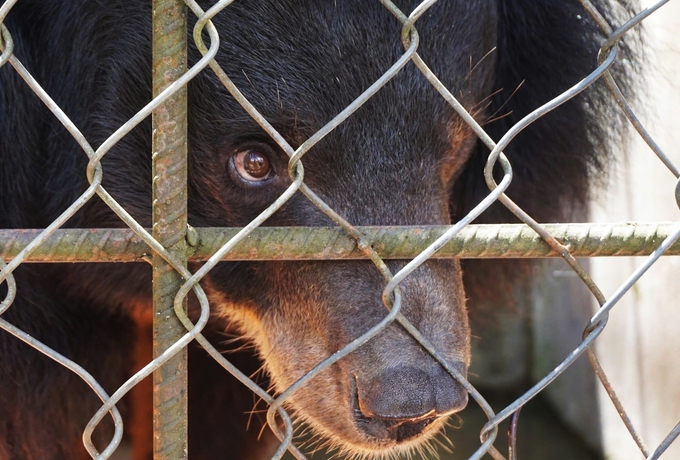
Hanoi remains the locality with the highest number of captive bears in the country. Photo: ENV.
However, Hanoi remains the locality with the highest number of captive bears in the country, accounting for about 49% of the total number of captive bears in Vietnam. As of the end of August 2024, there are still 94 bears being kept in 16 private facilities in Hanoi, with 94.7% of the bears concentrated in Phuc Tho District.
According to ENV, authorities in Hanoi can implement several activities for more effective outcomes, including increasing inspections and monitoring of bear farming facilities, promptly detecting and addressing illegal captivity and trade in bears, bear bile, and bear products. Particularly, efforts should be made to encourage remaining bear owners to voluntarily transfer their bears to the state without requiring compensation. Law enforcement agencies also need to timely address illegal advertising and trade of bears, bear bile, and other bear products that are proliferating online, especially through social media.
In 2005, MARD collaborated with the World Animal Protection (WAP) to implement the registration and electronic chipping of captive bears for identification and management purposes.
Mr. Le Duy Phuong, a consultant for WAP, stated that the two units have implemented an expanded monitoring program to check captive bears in farms after completing the new generation chipping. Any bear found without a chip and/or without management records is considered illegal and is confiscated to be sent to state rescue centers or rescue centers funded by non-governmental organizations.
“The bear monitoring program, along with the efforts of other NGOs, has significantly contributed to ending bear bile farming in Vietnam. This initiative also provides an opportunity for inspection team members to encourage bear owners to agree to transfer their bears to rescue centers,” Mr. Phuong added.
Translated by Kieu Chi
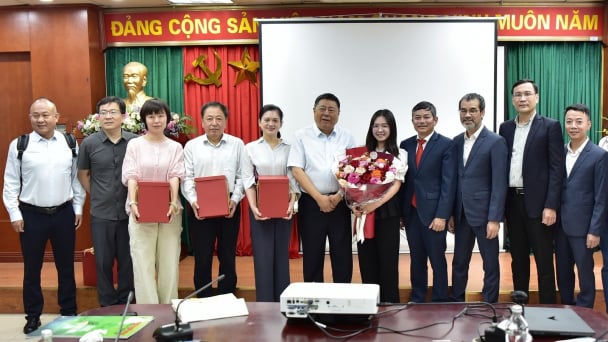
(VAN) The alignment in goals and operational direction between the Vietnam Agriculture and Nature Newspaper and Shaanxi Daily opens up promising prospects for journalism and media cooperation.
/2025/05/26/3422-3-102748_432.jpg)
(VAN) Prime Minister Pham Minh Chinh has been honored as the Distinguished ASEAN Leader at the ASEAN Leadership and Partnership Forum (ALPF) 2025 held in Malaysia, affirming Vietnam’s role and reputation.
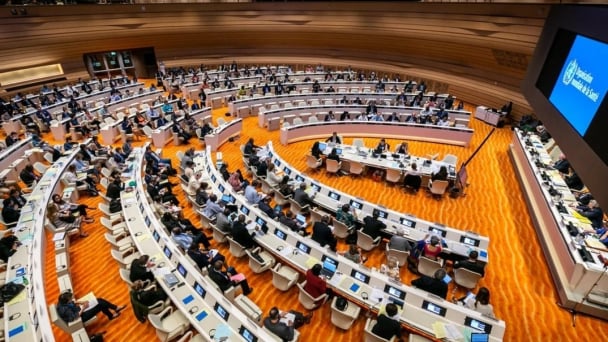
(VAN) At WHA78, with health placed at the heart of the global climate storm, Viet Nam enters a new commitment to protect communities from increasingly severe risks.
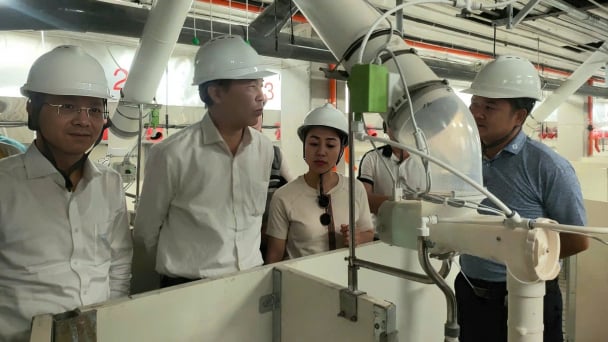
(VAN) Despite investment costs being 1.5 to 1.8 times higher than conventional methods, multi-story pig farming demonstrates outstanding effectiveness, increasing land-use efficiency by 4 to 10 times.
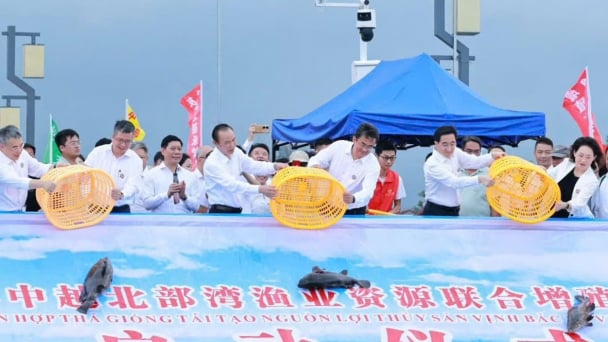
(VAN) Deputy Minister of Agriculture and Environment Phung Duc Tien leads a working delegation to participate in several key activities in China aimed at promoting agricultural and fisheries cooperation.
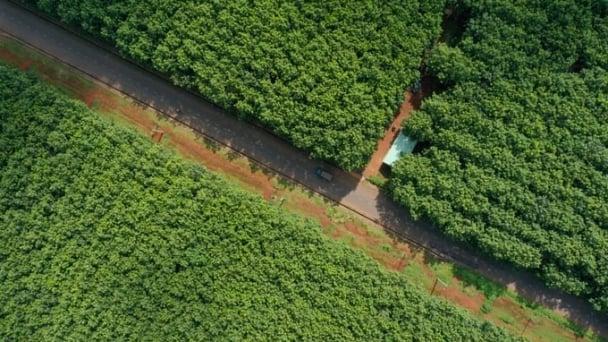
(VAN) The European Commission has just released a list of ‘low-risk’ countries for deforestation, which includes Vietnam.
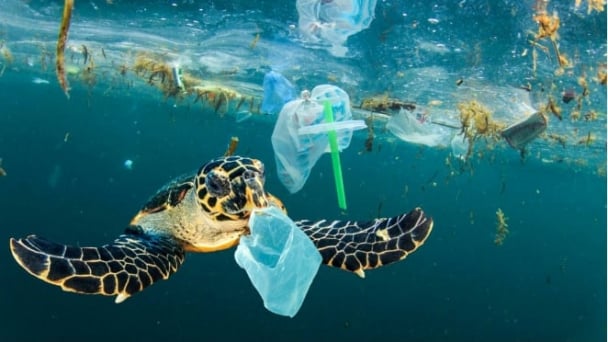
(VAN) The convenience of single-use plastics is leaving lasting consequences for the oceans.